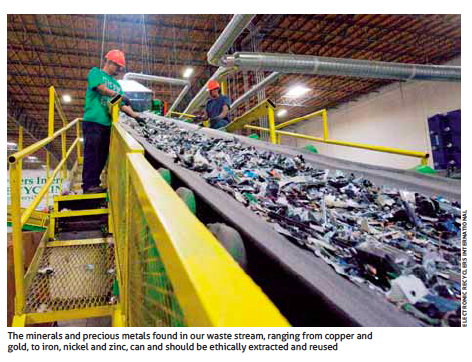As the urbanization of emerging Asian countries continues to reach new heights in the 21st century, the demand for finite materials also skyrockets. Everything from precious metals used in electronics to simple building materials such as wood and concrete are needed – and disposed of – at an alarming rate.
Increased sanctions and better awareness are necessary so that proper disposal of e-waste and the toxins within these products can be achieved. A new push for urban mining – the process of reclaiming compounds and elements from products, buildings and waste – is spreading fast around the world.

With mineral prices at an all-time high, now is a better time than ever to get mining. China’s demand for copper will grow 8 to 10% just this year alone. India, a country with one-third of its residents living in urban areas, continues its rapid industrialized growth at an unprecedented pace. In Japan, urban mining is booming following China’s decision to limit exports of rare earth minerals. Yet, if we are not careful, waste streams from these and other nations can have potentially devastating worldwide results.
As a result of careless tossing of electronics in the US, toxic trading has become a rampant issue throughout Asia. Potentially toxic e-waste from the United States is often plucked from landfills and discreetly shipped overseas, ending up in Chinese fields and streams or Indian recycling yards. These unconscionable actions must be stopped, and that is where the Basel Action Network (BAN) comes in. BAN is the world’s foremost international toxic trade policy advocacy group, and its experience in researching and investigating toxic trade is second to none. In particular, BAN’s E-Waste Stewardship Project aims to change the tide of toxic trade in developing Asian nations and beyond. The program works to ensure that exported hazardous electronic waste is exposed and eliminated by BAN, and replaced with producer responsibility and green design programs and legislation. Electronic Recyclers International (ERI) stands by BAN’s mission to end toxic trade, and the company is in the certification process to become an e-Steward, extending the company’s commitment to ending worldwide toxic trade. We have the technology at ERI to recycle electronics responsibly, efficiently and effectively. We have the opportunity to set an example for others to follow. We cannot wait for laws to be enacted to make appropriate changes in e-waste disposal. Companies like ERI must step up to the plate and act now. Urban mining is not only a rising trend in e-waste, it is also a necessity for healthy prosperity in the future. Already, South Korea’s LS-Nikko, one of the largest copper smelters in the world, has invested in ERI’s urban mining program. In turn, LS-Nikko gets enormous amounts of copper harvested from ERI’s recycling facilities. Likewise, the world’s leading aluminum producer, Alcoa, recently invested in ERI, enhancing the role aluminum plays in making electronics more sustainable. Alcoa recently became an enterprise member of the e-Stewards Certification Program. As we look to the future of leading nations in Asia, we must exercise environmental caution in our commitment to growth around the globe. Only then can we realize a resource efficient global market that ends the waste pile-up. By John Shegerian